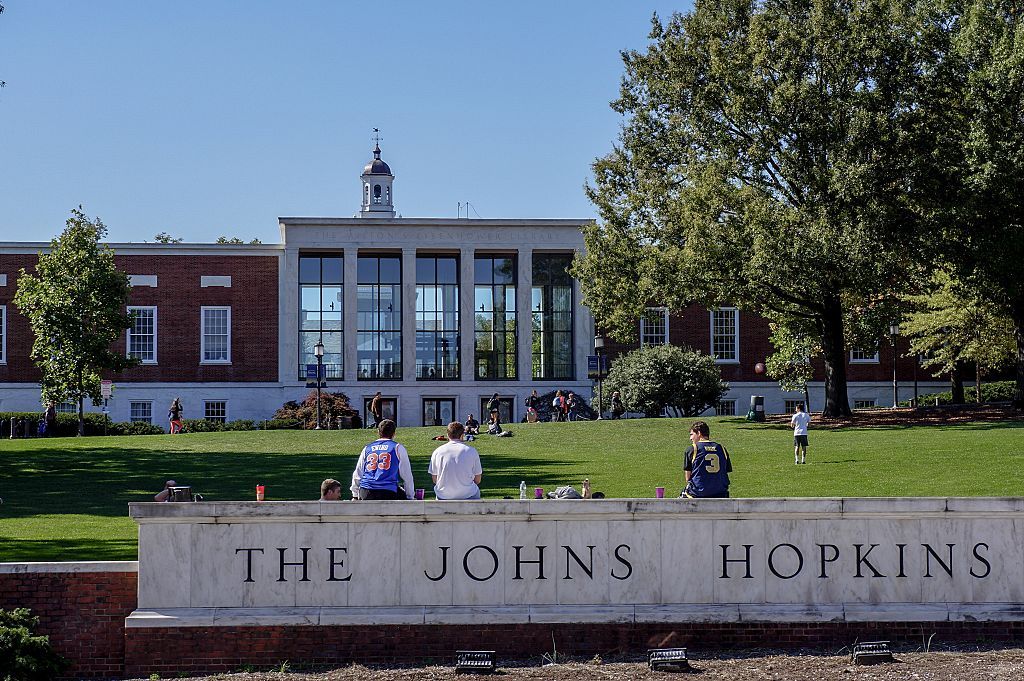Best Online Master’s in Public Health (MPH) Programs for 2025
Public health is a field to consider if you want to help improve the health of others and their communities. Demand is increasing for those looking for jobs in the sector, as well as for ways to learn the necessary skills to succeed. Fortune has compiled a list of the best online master’s in public (MPH) programs for 2025.
- Order/Rank
- A - Z
- Arizona
- California
- Florida
- Maryland
- Massachusetts
- Michigan
- New York
- North Carolina
- Ohio
- Oregon
- Tennessee
- Texas
- Ann Arbor, MI
- Baltimore, MD
- Berkeley, CA
- Boston, MA
- Chapel Hill, NC
- Claremont, CA
- College Park, MD
- Corvallis, OR
- Davie, FL
- Flagstaff, AZ
- Kent, OH
- Longmeadow, MA
- Los Angeles, CA
- Memphis, TN
- New York, NY
- San Diego, CA
- Waco, TX
- Weston, MA
*Please note that not all schools offer this specific type of information.

1. University of Maryland
College Park, MD| Acceptance rate | 93% |
| Accredited by CEPH? | Yes |
| Approx. total program cost, out-of-state U.S. residents | $46,620 |
| Retention rate | 100% |

2. San Diego State University
San Diego, CA| Acceptance rate | 42% |
| Accredited by CEPH? | Yes |
| Approx. total program cost, out-of-state U.S. residents | $30,804 |
| Retention rate | 93% |

3. Boston University
Boston, MA| Acceptance rate | 84% |
| Accredited by CEPH? | Yes |
| Approx. total program cost, out-of-state U.S. residents | $24,000 |
| Retention rate | 96% |
MPH@GW: An Online MPH With Connections in Washington, D.C.
Earn an MPH Online From GW While Continuing to Work in Your Community
Discover a Master of Public Health with Flexible Options for Working Professionals.

4. University of Michigan
Ann Arbor, MI| Acceptance rate | 81% |
| Accredited by CEPH? | Yes |
| Approx. total program cost, out-of-state U.S. residents | $54,985 |
| Retention rate | 98% |

5. Oregon State University
Corvallis, OROregon State University's online master's degree in public health practice requires 56 quarter-system credits and can be completed in two to seven years, depending on whether students attend full-time or part-time. While international students must submit English proficiency exam scores, no general standardized testing is required for admission. On average, students have approximately six years of prior work experience. Admission is open on a rolling basis from December to June.
| Acceptance rate | 89% |
| Accredited by CEPH? | Yes |
| Approx. total program cost, out-of-state U.S. residents | $32,326 |
| Retention rate | 97% |

6. Columbia University (Mailman)
New York, NY| Acceptance rate | 64% |
| Accredited by CEPH? | Yes |
| Approx. total program cost, out-of-state U.S. residents | $40,078 |
| Retention rate | 88% |

7. Johns Hopkins University
Baltimore, MD| Acceptance rate | 74% |
| Accredited by CEPH? | Yes |
| Approx. total program cost, out-of-state U.S. residents | $123,984 |
| Retention rate | 99% |

8. University of Memphis
Memphis, TN| Acceptance rate | 66% |
| Accredited by CEPH? | Yes |
| Approx. total program cost, out-of-state U.S. residents | $27,132 |
| Retention rate | 90% |
UNC's Online Master of Public Health Program
UNC's Online MPH: Full-Time and Part-Time Options. GRE Not Required.
Advance your public health career with UNC's online Master of Public Health program. Learn more.

9. University of North Carolina–Chapel Hill (Gillings)
Chapel Hill, NCThe online MPH degree from the University of North Carolina at Chapel Hill's Gillings School of Global Public Health has three concentrations: applied epidemiology, nutrition, and leadership in practice. The length of the program is variable, ranging from 20 months to five years maximum—based on student availability. All international applicants must submit official TOEFL scores or IELTS scores. On average, each core course has around 12 seats filled. The fall application deadline is July 1.
| Acceptance rate | 66% |
| Accredited by CEPH? | Yes |
| Approx. total program cost, out-of-state U.S. residents | $74,075 |
| Retention rate | 89% |

10. Kent State University
Kent, OH| Acceptance rate | 90% |
| Accredited by CEPH? | Yes |
| Approx. total program cost, out-of-state U.S. residents | $32,430 |
| Retention rate | 89% |

11. University of California—Berkeley
Berkeley, CAThe University of California, Berkeley School of Public Health offers an online MPH program with several unique concentrations, including epidemiology and biostatistics, food, nutrition and population health, health policy and management. Applicants are required to submit three letters of recommendation, and it is recommended that they have at least two years of prior work experience. International students must provide proof of English proficiency through standardized exams. On average, each core online MPH course has 75 students enrolled. Graduates report an average salary of $106,000 three months after completing the program. The fall deadline is March 13.
| Acceptance rate | 70% |
| Accredited by CEPH? | Yes |
| Approx. total program cost, out-of-state U.S. residents | $62,076 |
| Retention rate | 75% |

12. CUNY Graduate School of Public Health & Health Policy
New York, NY| Acceptance rate | 87% |
| Accredited by CEPH? | Yes |
| Approx. total program cost, out-of-state U.S. residents | $31,290 |
| Retention rate | 88% |

13. Claremont Graduate University
Claremont, CA| Acceptance rate | 45% |
| Accredited by CEPH? | Yes |
| Approx. total program cost, out-of-state U.S. residents | $88,880 |
| Retention rate | DNP |
Master’s in Health Administration Online
Healthcare is a serious business. Learn to manage it with Maryville's online MHA
Earn your Master of Health Administration (MHA) online from Maryville University in as few as two years. Prepare for leadership positions across a variety of healthcare settings.

14. University of Southern California
Los Angeles, CA| Acceptance rate | 74% |
| Accredited by CEPH? | Yes |
| Approx. total program cost, out-of-state U.S. residents | $98,868 |
| Retention rate | 89% |

15. Bay Path University
Longmeadow, MA| Acceptance rate | 100% |
| Accredited by CEPH? | No |
| Approx. total program cost, out-of-state U.S. residents | $27,300 |
| Retention rate | 92% |

16. Northern Arizona University
Flagstaff, AZ| Acceptance rate | 68% |
| Accredited by CEPH? | Yes |
| Approx. total program cost, out-of-state U.S. residents | $35,668 |
| Retention rate | 73% |

17. Nova Southeastern University
Davie, FL| Acceptance rate | 31% |
| Accredited by CEPH? | Yes |
| Approx. total program cost, out-of-state U.S. residents | $28,770 |
| Retention rate | DNP |

18. Baylor University
Waco, TX| Acceptance rate | 75% |
| Accredited by CEPH? | Yes |
| Approx. total program cost, out-of-state U.S. residents | $74,970 |
| Retention rate | 72% |
MPH@GW: An Online MPH With Connections in Washington, D.C.
Earn an MPH Online From GW While Continuing to Work in Your Community
Discover a Master of Public Health with Flexible Options for Working Professionals.
19. Regis College
Weston, MA| Acceptance rate | 66% |
| Accredited by CEPH? | No |
| Approx. total program cost, out-of-state U.S. residents | $29,400 |
| Retention rate | 86% |
MPH@GW: An Online MPH With Connections in Washington, D.C.
Earn an MPH Online From GW While Continuing to Work in Your Community
Discover a Master of Public Health with Flexible Options for Working Professionals.
Methodology
Fortune sought the opt-in from over 100 institutions with public heath programs. Nineteen schools with online master’s in public health programs returned our request and data questionnaire. The weights we used to rank them are as follows:
- Previous ranking/participation: 5%
- Annual search volume: 5%
- Accredited by the Council on Education for Public Health: 20%
- Total program cost, out-of-state U.S. residents: 10%
- Acceptance rate, academic year 2023-2024: 10%
- Yield, 2023–2024: 10%
- Average undergraduate GPA, 2023–24 enrollees: 10%
- Graduation rate, 2021-24: 10%
- One-year retention rate, 2023–24: 20%
Learn more: Read Fortune’s online master’s in public health methodology.
Public health master’s career paths
What is a master’s in public health?
A master’s of public health, or MPH, is an interdisciplinary graduate-level degree designed to educate students about a range of public health issues, including epidemiology, biostatistics, environmental health, health policy, and community health. Students in MPH programs will learn how to improve a community’s health and prevent disease and illness. Master’s degree programs in public health are offered both online and on-campus, though there’s no real difference beyond the format—rather, students can expect to be offered the same classes taught by the same professors.
General curriculum and skills taught
Because public health is such a wide-ranging topic, you can expect to take some general, foundational courses in a master’s degree program in public health—and then choose a concentration for specialization with the remainder of your time. At the University of North Carolina Gillings School of Global Public Health, for example, students take 14 credits of coursework, 15 credits of concentration courses, and nine credits of electives. Core competencies in a program range from science-related aspects of public health and the fundamentals of health policy to those that teach students to improve their communication and leadership skills. In general, expect an MPH curriculum to cover:
- Biostatistics
- Computer applications
- Data analysis
- Epidemiology
- Public health policy
- Resource management
- Social and behavioral determinants of public health
Specializations and concentrations
In addition to completing the required curriculum, students in graduate-level public health programs will branch off into specific concentrations depending on their interests and career aspirations. The range of possible specializations and concentrations vary by program, though there are 48 separate areas of study, according to the Association of Schools and Programs of Public Health. Some popular concentrations include:
- Biostatistics
- Community health
- Environmental health
- Epidemiology
- Genetics
- Health care management
- Immunology
- Infectious diseases
- Leadership
- Nutrition
- Tropical medicine
Admissions information
Admissions requirements for master’s degree programs in public health can vary by school, including the amount of relevant experience incoming students bring. Some schools attract many students who don’t currently work in public health and are trying to enter the field—so it doesn’t require any specific level of undergraduate training among applicants. Meanwhile, Johns Hopkins University requires applicants to have at least two years of post-undergrad experience working in a health-related field, as well as coursework in biology, math, and a health-related science (or a second biology course).
Online MPH programs generally require the following as part of the application process:
- Successful completion of a bachelor’s degree, as demonstrated by an official transcript from a college or university
- Demonstrate you have relevant academic or professional experience in a health-related field on your résumé
- A compelling personal statement or essay that demonstrates your understanding of the MPH degree and connects your unique characteristics and background to your program and post-graduation career goals
- Letters of recommendation from supervisors, professors, or alumni of the program
GMAT, GRE, and GPA
Most online master’s degree programs in public health on Fortune’s 2025 ranking do not require applicants to submit a GRE score to be considered for admission. The two exceptions are Nova Southeastern University, which only requires test scores if applicants’ cumulative GPA is below 3.0, and San Diego State University, which requires the GRE for those applying to the epidemiology MPH. That said, you may wish to submit a test score if it will strengthen your candidacy. Similarly, MPH programs on Fortune’s ranking don’t require a minimum GPA for admission, though they generally reported that incoming students had an average GPA of at least 3.2.
Which factors drive acceptance?
Public health programs were on the rise even before the pandemic, but with healthcare top of mind for more people than ever, standing out as a public health candidate is important for success. While admissions officers strive to take a holistic approach when evaluating candidates, they are particularly interested in why you want to pursue the degree and what you’re hoping to do with it following graduation. Because you’ll be freed up from standardized testing requirements, you should focus on crafting a personal essay that tells a compelling story about your candidacy.
The online master’s in public health program experience: What is it like to study online?
Online programs have more similarities with on-campus programs than differences. At many schools, the curriculum is identical, though how the material is taught may differ. Some institutions use a “flipped classroom model,” meaning students spend most of their week working on material asynchronously, then convene once a week for a live class.
Students in an online program can expect to participate in class discussions via Zoom or other video conferencing platforms. And because of the online format, many students who pursue a master’s degree in public health are working while attending school. Be it online or in-person, you can expect a graduate-level public health program to require at least 42 credits to complete—or about two years of full-time study.
Finally, even an online program may incorporate in-person elements. Some MPH programs include hands-on practicums or capstones, such as an internship at a healthcare facility, research or written assignments, or a community service project.
How to choose the best online master’s degree program in public health for you: Factors to consider beyond rankings
Fortune’s ranking of online master’s degree programs in public health is a good way to compare various programs. Our ranking relies on admissions data, program requirements, and student outcomes. However, some factors that one should consider are more difficult to quantify.
When choosing an MPH program, carefully consider how a particular program will help you achieve your career goals. For example, if you have a specific career path in mind—like becoming an epidemiologist—you may want to consider what concentrations a program offers. Furthermore, some students pursue a master’s in public health in tandem with a medical degree in a MD-MPH program, so the availability of a dual degree program may be important.
Accreditation by CEPH
It’s important to check whether a program you’re considering has been accredited by the Council on Education for Public Health (CEPH), an independent agency. In addition to accreditation, identifying a reputable program will help you with future job prospects.
Start times, schedule, and program length
One of the main appeals of an online program is that it offers flexibility. While these programs generally take about two years to complete, you may be able to set a faster or slower pace depending on your schedule. What’s more, you can choose from multiple start dates. Some schools allow cohorts to start in the fall, winter, spring, or summer.
Concentrations
Prior to applying to a MPH program, it’s important to carefully think about your goals post-graduation—even if they ultimately change—and the role that your selection of a concentration will play in qualifying you for various career opportunities. Carving out a specialty in public health could increase your earning potential. Consider this: The average pay for biostatisticians is about $103,000, whereas the salary for community health workers is half that—at about $48,200.
Cost
The cost of a master’s degree program in public health is certainly an important factor to consider when applying to school and deciding if an MPH is worth it. Tuition varies widely, from about $30,000 to more than $85,000, and while scholarships and financial aid can help cover that cost, private loans are the most common way that students pay for their MPH. Because salaries also vary for MPH holders, consider your potential debt burden post-graduation and look for help paying for your degree—including scholarships, financial aid, and fellowships.
Network and access to alumni
A larger student body means a larger alumni network—which is valuable, especially if you’re switching careers and looking for jobs. You should consider this during your selection process because your cohort can be a defining characteristic of your grad school experience even if you’re attending classes online.
Immersive experiences (on-campus visits)
If you’re hesitant about attending classes online, some MPH schools offer immersive experiences that incorporate on-campus elements in the program. This may be a factor to consider if you want the opportunity to network in person or be close to campus to take advantage of resources like the library. What’s more, many programs include hands-on practicums or capstones such as an internship.
Careers for master’s in public health graduates
With respect to career opportunities for MPH graduates, “the sky is really the limit,” as a director at the Public Health Foundation previously told Fortune. While public health departments are a natural fit for people with a master’s degree, many graduates also go into epidemiology, data analytics, and biostatistics. What’s more, there’s been a surge in interest in MD-MPH programs, with a 434% growth in the number of students pursuing this dual degree between 2010 and 2018. Finally, an MPH degree has a wider application than strictly in the medical realm, as many graduates can land jobs in business and technology companies, as well.
Financing and scholarships
Just as cost and the salary associated with your desired career path are important factors to consider, so too are the ways you plan to pay for your graduate degree. If you’re pursuing an MPH to advance your career within your current company, then your employer may help pay for the cost of the program. Otherwise, there are a number of scholarship opportunities available to students—including those offered by the schools, though additional essays may be required for consideration. George Washington’s MPH program, for example, guarantees a tuition scholarship of $10,000 to students who are accepted and enrolled.
You may also want to seek out a growing number of scholarship or fellowship opportunities from private organizations. Some examples that are available to master’s degree students include:
- The Academy of Nutrition and Dietetics Foundation awards scholarships ranging from $5,000 to $25,000 to students pursuing an advanced degree in nutrition and dietetics or a related field who intend to practice within the field of dietetics.
- The Society for Public Health Education awards three $2,5000 scholarships each year to SOPHE-member students who are committed to addressing the public’s health through a career in health education, and who have demonstrated financial need. Students must have completed at least one-third of the coursework for their major to qualify.
- The David A. Winston Health Policy scholarship is specifically for students committed to a health policy-related master’s degree. For 2025, the organization planned to give out up to 20 awards of $10,000 each. Finally, current members of the military or veterans may want to consider covering the cost of your public health degree with Post-9/11 GI Bill benefits or the Yellow Ribbon Program, which can cover any tuition and fees not covered by those benefits.
Frequently asked questions
What is the best master's in public health?
The University of Maryland is home to the best master’s in public health for online learners. The school is accredited by the Council on Education for Public Health, has a perfect graduation rate, retention rate, and yield, and tuition is about $46,000.
Are there any one-year online MPH programs?
No, MPH programs take about two years to complete, at a minimum. However, some schools have accelerated programs that may speed up the process. For example, Baylor University has an accelerated OMPH that allows students to complete the degree in 17 months.
Do I need to submit a GRE score to apply to an online master’s in public health program?
No, most schools on Fortune's 2025 ranking of the best online master's degree programs in public health do not require candidates to submit a GRE score with their application. That said, most schools still do allow applicants to submit scores to potentially boost their package.
Do I need a bachelor’s in public health to apply for an MPH degree?
No, but some top-ranked programs are looking for applicants who have post-baccalaureate experience working in a health-related field, as well as coursework in biology, math, and health-related science.
Do I need work experience for MPH degree applications?
Some public health programs would like applicants to have some relevant experience, though that can be broadly defined, and the requirement isn’t strict.
Are MPH degrees worth it?
A master’s degree in public health can open more doors to career opportunities and higher salaries than simply an undergraduate degree. The average salary for someone with a bachelor’s degree in public health is $64,000 per year, and it’s $75,000 per year for someone with an MPH, according to data from Payscale.
How much does it cost to pursue an MPH?
Costs for online master’s degree programs in public health vary widely. At No. 7-ranked Johns Hopkins University, the tuition is $120,000 while that amount falls to about $30,000 at places like No. 2-ranked San Diego State University or No. 8-ranked University of Memphis. Scholarships are available, though most students obtain loans to cover the cost of the degree.
Is it hard to get into MPH?
Master’s degree programs in public health are rigorous, and students must complete foundational classes and may select from nearly 50 concentrations for specialization. In addition to coursework, students may need to juggle other school-related obligations, including internships or integrative learning experiences.
Is MPH good for medical school?
Some aspiring doctors are trying to get a leg up on their peers by first earning a master’s degree in public health to give themselves a competitive edge in the admissions process for medical school. These students may choose to pursue an MPH before, during, or even after their schooling or residency. The president-elect of the American Public Health Association, Deanna Wathington, has both an MD and MPH.
What is the best specialization for a master’s in public health?
The best master’s in public health specialization depends on your career goals. For those who are good at mathematics and data analysis, then a specialization in biostatistics could be promising. If disease spread is of interest, then study epidemiology. Keep in mind that career pathways like epidemiology or biostatistics tend to pay more than areas like community health.
Related Articles

Best health coach certifications for 2024
April 1, 2024







